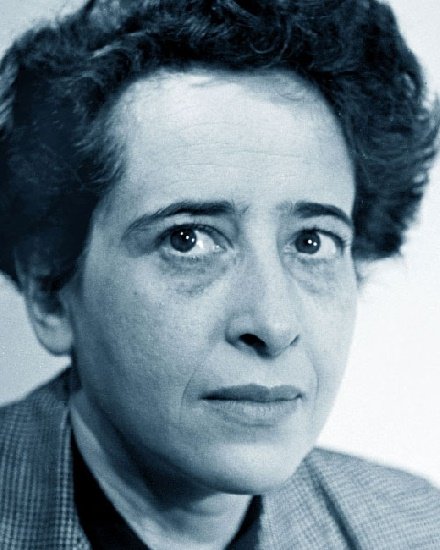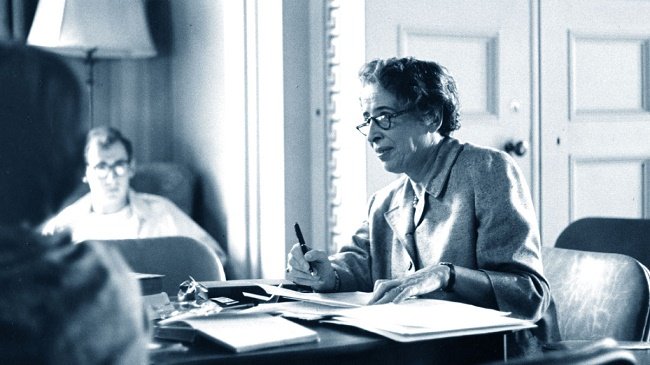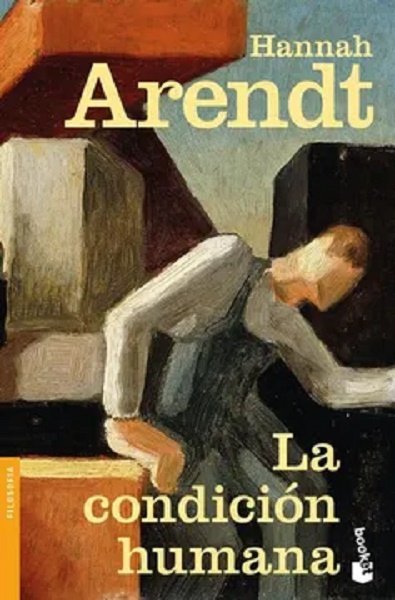Hannah Arendt o el acucioso pensamiento acerca de la condición humana | Hannah Arendt or the careful thinking about the human condition
Hannah Arendt es quizás la más importante pensadora o filósofa del siglo XX (junto a Simone de Beauvoir, María Zambrano y Simone Weil). Nacida en Alemania el 14 de octubre de 1906, y de familia judía, tuvo una formación académica y personal que contó con la enseñanza de grandes maestros, como Edmund Husserl, Karl Jaspers y Martin Heidegger, con quien mantuvo un cierto romance. Perseguida por el régimen nazi, que le quitó la nacionalidad, tuvo que emigrar a Francia y Estados Unidos, país en el que se estableció en 1941 y obtuvo la nacionalidad en 1951, y en el que ejerció como profesora de las universidades de Berkeley, Princeton, Columbia y Chicago.
============
Hannah Arendt is perhaps the most important thinker or philosopher of the twentieth century (along with Simone de Beauvoir, Maria Zambrano and Simone Weil). Born in Germany on October 14, 1906, and from a Jewish family, she had an academic and personal formation that counted on the teaching of great masters, such as Edmund Husserl, Karl Jaspers and Martin Heidegger, with whom she had a certain romance. Persecuted by the Nazi regime, which deprived her of her nationality, she had to emigrate to France and the United States, where she settled in 1941 and obtained her nationality in 1951, and where she worked as a professor at the universities of Berkeley, Princeton, Columbia and Chicago.

Hannah Arendt no sólo fue una estudiosa de la tradición filosófica occidental, sino que puso en cuestión varios de los postulados de sus representantes, y desarrolló un pensamiento de suma agudeza y complejidad acerca del estado de la humanidad en el mundo contemporáneo, al revisar muchos de sus presupuestos. Esto la convierte, además, en una pensadora de lo político, en su amplio sentido. De allí su producción intelectual publicada, entre los cuales pueden destacarse sus libros: El origen del totalitarismo (1951), La condición humana (1958), Eichmann en Jerusalén. Un estudio sobre la banalidad del mal (1963), Hombres en tiempos de oscuridad (1968), Sobre la violencia (1970).
Tiene entre sus grandes aportes haber sido una de las primeras en pensar el totalitarismo y desentrañar sus claves, centrándose en el nazismo y el estalinismo soviético. Entre sus contribuciones al pensamiento filosófico-político está la consideración acerca de la banalidad del mal. Esta idea la formula en su estudio a propósito del juicio que en 1961 se llevó a cabo en Jerusalén contra Adolf Eichmann, teniente coronel de las SS y uno de los mayores criminales de la historia. Se interroga Arendt sobre cómo un hombre capaz de cometer las atrocidades colectivas en contra de otros, se cree simplemente un ordinario operador de órdenes que ejecuta eficientemente. Y aquí es donde resalta la profundidad de su visión: se puede llegar a ser el mayor perpetrador del horror y creerse un simple administrador con vida cotidiana y común sin culpas. Es una historia repetida en el pasado y en el presente.

Hannah Arendt was not only a scholar of the Western philosophical tradition, but also questioned several of the postulates of its representatives, and developed a thought of great acuity and complexity about the state of humanity in the contemporary world, revising many of its assumptions. This also makes her a thinker of the political, in its broadest sense. Hence her published intellectual production, among which her books stand out: The Origin of Totalitarianism (1951), The Human Condition (1958), Eichmann in Jerusalem. A Study on the Banality of Evil (1963), Men in Times of Darkness (1968), On Violence (1970).
She has among her great contributions to have been one of the first to think about totalitarianism and to unravel its keys, focusing on Nazism and Soviet Stalinism. Among her contributions to philosophical-political thought is the consideration of the banality of evil. He formulates this idea in his study of the 1961 trial in Jerusalem of Adolf Eichmann, SS lieutenant colonel and one of the greatest criminals in history. Arendt wonders how a man capable of committing collective atrocities against others, believes himself to be simply an ordinary operator of orders that he executes efficiently. And this is where the depth of her vision shines through: one can become the greatest perpetrator of horror and believe oneself to be a simple administrator with an ordinary, everyday, guiltless life. It is a story repeated in the past and in the present.

El pensamiento de Hannah Arendt, que he tratado de seguir en lo posible, es de muy amplio alcance. He decidido para este post tomar sólo unos fragmentos de su libro La condición humana, un magnífico estudio histórico, filosófico y político sobre la trayectoria humana. Los copiaré seguidamente, sin comentarios de mi parte, pues ellos se explican a sí mismos.
(…) pudiera ser que nosotros, criaturas atadas a la Tierra que hemos comenzado a actuar como si fuéramos habitantes del universo, seamos incapaces de entender, esto es, de pensar y hablar sobre las cosas que, no obstante, podemos hacer.
Por lo tanto, lo que propongo es muy senillo: nada más que pensar en lo que hacemos.
La pluralidad es la condición de la acción humana debido a que todos somos lo mismo, es decir, humanos, y por tanto nadie es igual a cualquier otro que haya vivido, viva o vivirá.
(…) los hombres, no importan lo que hagan, son siempre seres condicionados.
(…) la sociedad de masas no sólo destruye la esfera pública sino también la privada, quita al hombre no sólo su lugar en el mundo sino también su hogar privado.
Estar en soledad significa estar con uno mismo, y pensar, aunque sea la más solitaria de todas las actividades, nunca es completo sin compañía.
Si todo se ha hecho dudoso, al menos la duda es cierta y real.
Si fuera verdad que soberanía y libertad son lo mismo, ningún hombre sería libre, ya que la soberanía, el ideal de intransigente autosuficiencia y superioridad, es contradictoria a la propia condición de pluralidad.

Hannah Arendt's thought, which I have tried to follow as much as possible, is very broad in scope. I have decided for this post to take only a few excerpts from her book The Human Condition, a magnificent historical, philosophical and political study of the human trajectory. I will copy them below, without commentary on my part, since they are self-explanatory.
It may be that we, earth-bound creatures who have begun to act as if we were inhabitants of the universe, are incapable of understanding, that is, of thinking and speaking about the things we can nevertheless do.
Therefore, what I propose is very simple: just think about what we do.
Plurality is the condition of human action because we are all the same, that is, human, and therefore no one is the same as anyone else who has lived, lives or will live.
(...) men, no matter what they do, are always conditioned beings.
(...) mass society destroys not only the public sphere but also the private sphere, takes away from man not only his place in the world but also his private home.
To be in solitude means to be with oneself, and thinking, though the loneliest of all activities, is never complete without company.
If everything has become doubtful, at least the doubt is certain and real.
If it were true that sovereignty and freedom are the same, no man would be free, for sovereignty, the ideal of uncompromising self-sufficiency and superiority, is contradictory to the very condition of plurality.
============
No me queda más que decir que ojalá nuestros políticos o aspirantes a tal, dejando a un lado su soberbia y aceptando su ignorancia, pudieran leer a Hannah Arendt. También al ciudadano común le vendría muy bien.
I can only say that I wish our politicians or aspiring politicians, leaving aside their arrogance and accepting their ignorance, could read Hannah Arendt. It would also do the common citizen a lot of good.
Referencias | References:
Arendt, Hannah (2005). La condición humana. España: Ediciones Paidós.
Arendt, Hannah (2006). Hombres en tiempo de oscuridad. España: Gedisa Editorial.
https://eltalondeaquiles.pucp.edu.pe/wp-content/uploads/2015/09/Eichman-en-Jerusalem.pdf

Gracias por su lectura | Thank you for reading.





https://inleo.io/threads/josemalavem/re-josemalavem-2xlg5ahwn
The rewards earned on this comment will go directly to the people ( josemalavem ) sharing the post on LeoThreads,LikeTu,dBuzz.
Qué profundidad filosófica sobre la condición humana!
Gracias por compartir!
Gracias a ti por leer mi post. Saludos, @aljif7.
Saludos, excelente exposición y motivación para acercarnos al pensamiento y escritos de esta filósofa, uno de los puntos de reflexión importante para la filosofía hoy es sin lugar a dudas la política, puesto que los buenos políticos brillan por su ausencia.
Te invito a compartir tus reflexiones filosóficas en la comunidad de humanitas, donde queremos construir el acervo humanístico para las humanidades en la web 3.
!PIZZA
!KING
Gracias por tu visita y por el comentario. Si te interesa la filosofía política, y no has leído a Arendt, te la recomiendo completamente. También gracias por la invitación. Una que otra vez he puesto a #humanitas en las etiquetas de mis posts. Saludos, @jesusalejos.
Keep up the good work King @josemalavem, jesusalejos(4/6) is appreciative of the time and dedication you put into writing this post. Your efforts are truly valued.
Your content never ceases to amaze us! @jesusalejos wants to show their appreciation with a gift of 0.025 HKGENTHREE.
BTW! You will find powerful and charismatic NFTs in the AVATAR PACKS that you can use in all our games.
$PIZZA slices delivered:
@jesusalejos(4/10) tipped @josemalavem
Thanks, @pizzabot.